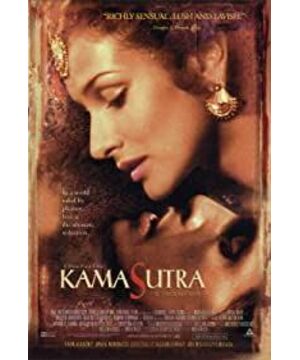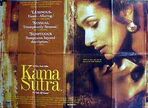Hinduism is extraordinarily mysterious. One of its three main gods, Shiva, is both the god of creation and the god of destruction; it not only represents penance, but also symbolizes indulgence. Indian culture has been in such a system of binary contradictions for thousands of years.
I have seen almost only one Indian blockbuster, and it is also a treasure trove of temptations (also known as the Sexual Classic) with English dialogue. I personally think that the title of the film should be changed to Desire and Jealousy. This book is a real book, and the protagonist of the movie is also a rare beautiful woman. Love can be acquired through practice, and it is a profound compulsory course. Women must learn to use their own eyes and dancing waist to seduce the man they like. There are several scenes of dancing in the movie. The maid and the princess wear copper bells around their waists and dance gracefully with their eyes.
I heard that New Delhi is notoriously chaotic, and tourists may be deceived. Due to the poor economic prosperity of India, the gap between the rich and the poor is too large. The Indian upper class still retains the habit of sending their children to England for higher education. Therefore, there are many people in India who can speak English, but it is said that the pronunciation is really ugly.
Indian literature is very distinctive. A few months ago, I read Sakon Darrow, some old famous drama. The protagonist.. (the name can't be remembered) is the adopted daughter of a priest who practices asceticism in the forest. She is seduced by the king Dousando and then abandoned. In the Mysterious Forest, the king is identified by the footprints of women. Her footprints were shallow at the front and deep at the back, the typical oriental beauties described in One Thousand and One Nights—thin waist and heavy back. Such women are also considered to be fertile in the East, and it is natural for men to be obsessed with them.
Speaking of One Thousand and One Nights, one can't help but think of Zhou Xiaofeng's dark fairy tale, which contains a description of the dark nature of One Thousand and One Nights.
"The whole origin of '1001 Nights' has to do with sex."
"For many years, I carried through the naive understanding of "The Thousand and One Nights", until it was changed by the re-reading of the university. The surprising turning point happened before the end: after the one thousand and one nights, Shanlu Zod gave birth to three sons for the king. The content filtered out by my purity and ignorance emerges ironically, Scheherazade not only has vivid lips, but also has flexible and undulating waist, she has spent one life after another. The night, not entirely due to literature, in which sex also has a proportion. In those voyages of stories, walking on mountains and rivers, resting on her lingering flesh, after the sweet rhythm, the king pours into the drunken relaxation before falling asleep. You and I are not Wang, just a reader from far away, how can you compare Scheherazade's lips and waist, which is the decisive magic weapon?"
--------From Zhou Xiaofeng's Black Fairytale
Comparing Eastern and Western cultures, we will find wonderful Irony: In the age of openness and diversity in Eastern culture, the West is in the throes of suppressing abstinence. After the 19th century, there was a 180-degree turn. The West is vigorously engaged in "feminism", but the women of the East are still perfecting their female beauty under heavy shackles.
In fact, when Westerners hear the words "Oriental Culture", they think of India and Japan more than China. Both countries have somewhat better preserved their mystical side. China.. Modern Chinese culture is the process of Westernization...
Zhou Xiaofeng wrote "Fragrant oil. Vase. Curtain. Jewelry. Gold and silver utensils. Magic lamp. Flying carpet. Beautifully dressed dancers. Mosque. Koran. Persia. Baghdad .My mind is full of words that have nothing to do with my own life, this is the enchanting East that fits my imagination." The
enchanting East, the woman with the veil slowly walked out of the mist.
Let us also sigh for this, a thousand years.
View more about Kama Sutra: A Tale of Love reviews











